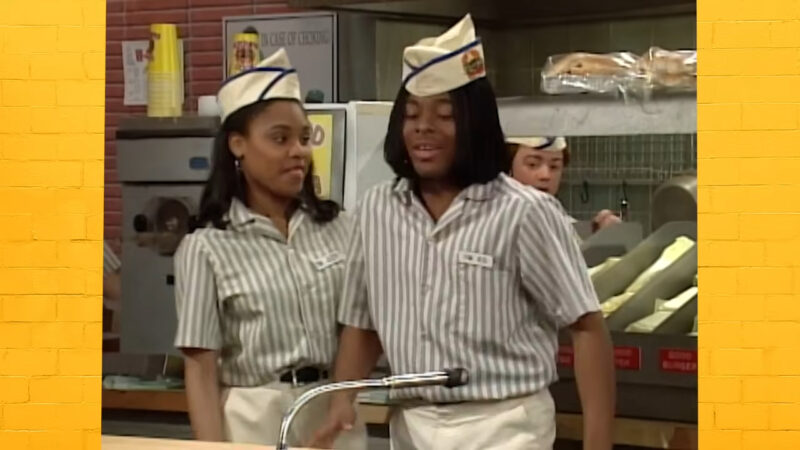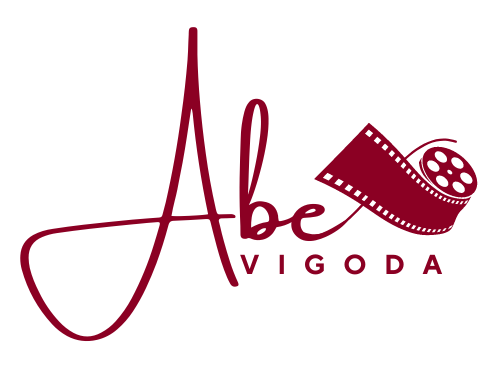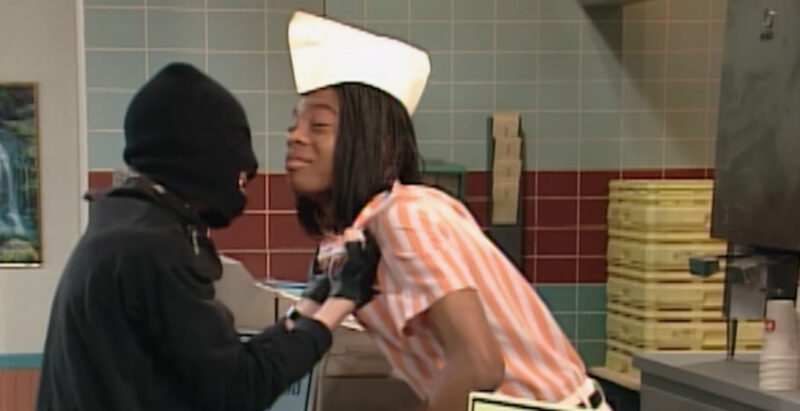Good Burger is a nostalgic trip back to the quirky, carefree days of 90s kid culture.
Released in 1997, it captures the offbeat humor and charm that Nickelodeon became famous for, making it a standout film from the era.
Filled with eccentric characters, wacky scenarios, and a heartfelt message about friendship, Good Burger has earned its place as a beloved 90s classic.
Let us talk about the reason why this movie is considered a classic
1. A Weird and Wonderful Tribute to 90s Kids

Good Burger is a quintessential product of Nickelodeon’s golden age. The network was known for creating content that didn’t just entertain kids but embraced their oddities and quirks, something that made it resonate deeply with 90s youth.
Good Burger takes this to heart, with a narrative that embraces the weird, the gross, and the chaotic.
The film taps into Nickelodeon’s signature style of “weirdness,” presenting over-the-top, surreal humor that was an integral part of shows like All That and Kenan & Kel.
Scenes like Ed getting sucked into a milkshake machine or giant meat explosions aren’t just visual gags, they represent the exaggerated and surreal situations that Nickelodeon fans had come to expect and love.
The humor is outrageous and delightfully absurd, inviting kids into a world where bizarre events are the norm. One of the characters that adds to the film is Otis, played by Abe Vigoda.
In fact, this sense of controlled chaos, where weirdness and unpredictability reign supreme, is one of the key reasons why the film resonated so strongly with 90s kids.
It was a celebration of oddity, inviting audiences to laugh at life’s quirks and embrace the strange and silly.
2. Lovable, Eccentric Characters
One of the film’s most lasting and beloved features is its eccentric cast, with Ed, portrayed by Kel Mitchell, at the forefront. Ed is an innocent, well-meaning character who lives in his quirky world, filled with an unshakeable enthusiasm for his job at Good Burger.
His unforgettable catchphrase, “Welcome to Good Burger, home of the Good Burger, can I take your order?” has become emblematic of 90s nostalgia.
Ed’s combination of oddball behavior and infectious positivity made him a favorite among kids who admired his simplicity and laughed at his quirky antics.
- Innocent and clueless
- Unfailing enthusiasm for his job
- Lovable despite his oddness
- Famous for his iconic catchphrase
- Positive and loyal
On the other hand, Dexter, played by Kenan Thompson, adds balance as a more practical and self-interested character at the beginning of the film. Dexter starts as cynical and focused on his gain, but his relationship with Ed becomes the movie’s emotional anchor.
As the story unfolds, Dexter’s perspective shifts, and he learns that Ed’s eccentricity is not something to mock but something to value.
The dynamic between Ed’s unwavering heart and Dexter’s eventual realization of friendship’s importance drives the film’s core message about appreciating people for who they truly are.
- Practical and cynical
- Initially self-serving
- Grows to value friendship
- Learns to appreciate Ed’s uniqueness
Together, Ed and Dexter’s evolving bond forms the foundation of Good Burger, creating both comedic moments and valuable lessons on friendship and acceptance.
3. Good Burger vs. Mondo Burger
At the core of Good Burger lies a classic David-and-Goliath battle between the humble, small-town Good Burger and the flashy, corporate giant, Mondo Burger.
This conflict highlights a prevalent theme of the 90s: the fight between corporate greed and the underdog.
Mondo Burger is depicted as everything Good Burger is not—excessively corporate, unethical, and obsessed with image. The character of Kurt, Mondo Burger’s ruthless leader, embodies a caricature of greed, going to absurd lengths to crush his competition and dominate the fast-food world.
- Kurt (Mondo Burger’s Leader): Kurt is the ultimate villain, representing corporate exploitation. He is manipulative, scheming, and willing to cross any ethical boundaries to achieve success. His exaggerated personality and over-the-top schemes serve as the perfect contrast to Good Burger’s authenticity and sincerity.
- Ed (Good Burger’s Employee): Ed’s simple, well-meaning personality makes him the ideal foil to Kurt’s conniving and greed. His innocence and genuine love for his job are what make Good Burger stand out, serving as a reminder that heart and passion can overcome any challenge, even when the odds are stacked against you.
The dynamic between the two establishments reflects the 90s emphasis on rooting for the little guy, standing up to unfairness, and celebrating authenticity over artificiality.
In the end, it’s the loyalty, heart, and friendship of Good Burger’s employees, particularly Ed, that prevail. This reinforces the idea that staying true to yourself is far more important than chasing success at any cost.
4. Iconic Soundtrack and Comedy Elements
One of the standout features of Good Burger is its unforgettable soundtrack, blending:
- Upbeat funk
- Hip-hop
- Pop tunes
This musical mix not only reflects the essence of 90s culture but also enhances the film’s quirky, offbeat vibe.
For example, the memorable asylum dance scene, inspired by Michael Jackson’s Thriller, is made even more outrageous by the energetic music that perfectly complements the chaos.
The soundtrack amplifies the film’s zaniness, making key scenes stick in the audience’s mind long after the movie ends.
Comedy is the driving force behind Good Burger, balancing physical humor, slapstick gags, and witty one-liners. The humor appeals to both kids and adults alike.
Ed’s character, in particular, provides countless moments of absurdity, whether he’s engaging in bizarre antics or delivering unexpected insights.
His cluelessness combined with his charm makes him the focal point of much of the film’s humor. Dexter, on the other hand, serves as a perfect foil to Ed’s silliness, bringing a more grounded sense of humor that contrasts with Ed’s chaotic nature.
5. A Message of Friendship and Acceptance
Beyond its outrageous humor and zany scenarios, Good Burger delivers a touching message about friendship and acceptance.
At its heart, the movie teaches the importance of accepting people as they are, without trying to change them.
- Ed: Ed’s quirky personality, odd habits, and innocent outlook on life initially make him come across as just a goofy, clueless coworker. However, as the story unfolds, his quirks clearly define him as lovable. The people around him embrace his genuine nature, unwavering positivity, and strange but endearing behavior.
- Dexter: At first, Dexter approaches Ed with pragmatism and cynicism, viewing him as nothing more than a means to an end. But as their friendship deepens, Dexter learns to appreciate Ed’s quirks, recognizing that his eccentricity isn’t something to change, it’s what makes him special.
The film’s message of embracing individuality struck a chord with Nickelodeon’s audience, many of whom might have felt like they didn’t quite fit in themselves.
Good Burger is a refreshing reminder that everyone brings something to the table, no matter how unconventional they may be.
This celebration of individuality, paired with the movie’s emphasis on the strength of genuine friendships, gives the film emotional depth beyond its comedic surface, offering both heart and laughter.
The Bottom Line
In the end, Good Burger is more than just a goofy comedy, it’s a celebration of friendship, individuality, and the weirdness that defined 90s kids’ culture.
Its iconic characters, memorable humor, and heartwarming message have cemented it as a classic, loved by those who grew up with it and cherished by new generations discovering it for the first time.

